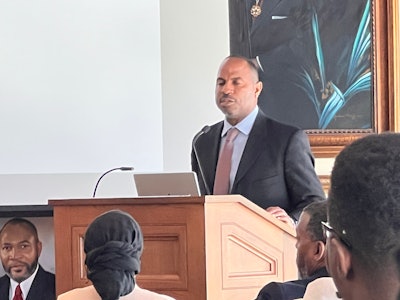 Dr. Derrick BroomsAllison Joyner
Dr. Derrick BroomsAllison Joyner
"We want to account for things like a social father or a community father who might also be a 'father on the block,'" said Dr. Derrick Brooms, executive director of BMRI and professor of Africana Studies. At the first day of the convening on Wednesday, Brooms emphasized the distinction between "fatherhood" as a status and "fathering" as active engagement in nurturing youth.
The two-day symposium on "Black fathers, fatherhood, and fathering" represents a cornerstone initiative for the BMRI, which was established to reframe narratives surrounding Black men's experiences in their families and communities. According to Brooms, the institute aspires to have both national significance and international reach by fostering meaningful conversations between researchers, scholars, community members, and thought leaders.
"The BMRI is committed to advancing understanding beyond stereotypes and misconceptions that have historically dominated discussions about Black fathers," Brooms told attendees during his opening remarks. "Our goal is to highlight the diverse ways Black men contribute to child-rearing and community building, often in circumstances that remain unacknowledged in mainstream discourse."
Featured speaker Dr. Aasha Abdill, author of Fathering From The Margins: An Intimate Examination of Black Fatherhood, presented findings from her decade-long ethnographic research conducted from the mid-2000s to early 2010s. Her qualitative approach, which studies culture and social relations from the perspective of the people directly involved, revealed significant trends challenging popular narratives about Black fatherhood.
"My data showed an increase in fathers serving as primary escorts for their children to school, and a corresponding decrease in fathers who were never seen," Abdill explained. "Because something happening doesn't necessarily mean that people are aware of it, this research helps make visible what has been occurring beneath the radar of public perception."

















